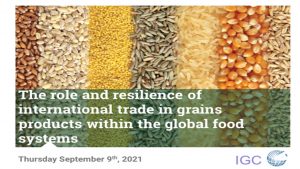الملاحظات التقييمية الرسمية على الحوارات إلى قمة الأمم المتحدة للنظم الغذائية لعام 2021
نوع الحوار
بدعوة من
لغة فعالية الحوار
التاريخ/الوقت
إلى:
المدينة
نطاق التركيز الجغرافي
التنسيق
يُرجى مراجعة التفاصيل أدناه للحصول على معلومات التسجيل إذا كانت متوفرة أو الاتصال بمنظم الحوار إذا كنت ترغب في الحضور.
القيّم
الوصف
Agribulk commodities, such as wheat, maize, oilseeds and rice, represent more than 80% of the energy uptake for human consumption. The current five-year supply and demand projections for these commodities show an increase in demand, mainly due to demographic trends and consequently a growth in trade as there is very little new land available. Climate change will enhance the role of international trade as a central component of global food security, including the movement of calories from food-surplus to food-deficit countries in the wake of natural calamities. Throughout history, international trade has helped to reduce food insecurity by connecting regions with large populations and limited agricultural potential to regions with comparative advantages in agriculture, while also providing access to a more diverse and nutritious food basket.
In the grains sector, the major exporters of these commodities are playing a crucial role in enhancing the resilience of the global food system. However, increased exports can put pressure on their domestic market (such as inflation of domestic food prices,) while the risks associated with climate change, such as rising sea-levels may threaten their logistical supply chains. These risks also impact importing regions, which may look to source their supplies from alternative suppliers or stimulate local value chains.
The global market can play a significant role in supporting a nation’s food security not only when the local production capacity fails. However, many countries which rely on international supplies are also concerned about sudden increases in import costs, as well as shipping and logistical disruptions. These concerns may encourage countries to seek self-sufficiency, including increased domestic stocking requirements. Furthermore, restrictive import/export policies, spanning both tariffs and NTMs, as well as distortive subsidies for both the agricultural and the transportation sector, can hinder the free-flow of global trade.
In the long run, less exposure to global trade would result in markets becoming less liquid, likely increasing price volatility and consequently increasing the risk for importers, including those countries unable to seek self-sufficiency due to generally unfavourable climatic conditions or a lack of arable land. Furthermore, there are also considerable fiscal costs associated with achieving self-sufficiency and, while local consumption may reduce food-miles, any calculation of emissions throughout the transportation process has to be offset against emissions from farming processes, which vary from producer to producer. And consumers will also continue to expect a varied diet.
The webinar will be attended by invited participants encompassing the private sector, research and public administrations.


